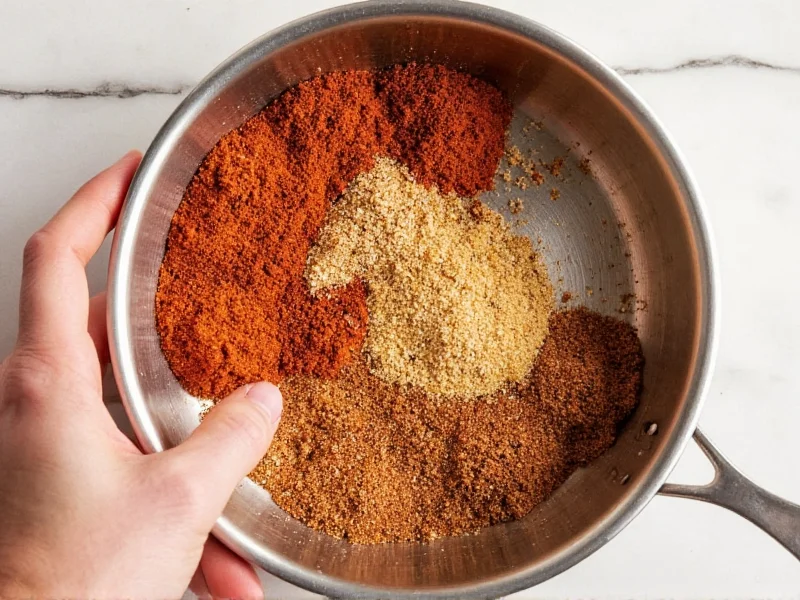Creating your own fajita seasoning is simpler than you might think and offers significant advantages over store-bought versions. When you make homemade fajita seasoning from scratch, you control the ingredients, avoid preservatives and fillers, and can customize the flavor profile to your exact preferences. This authentic spice blend delivers vibrant, restaurant-quality results that elevate your chicken, beef, or vegetable fajitas with minimal effort.
Why Make Your Own Fajita Seasoning
Commercial fajita seasoning mixes often contain anti-caking agents, excess salt, and mysterious "spice blends" that dilute authentic flavor. By preparing your DIY fajita seasoning mix, you gain several advantages:
- Complete ingredient transparency and control over sodium levels
- Fresher, more vibrant flavors than pre-packaged alternatives
- Cost savings compared to specialty store-bought blends
- Customization options for heat level and flavor complexity
- No unnecessary additives or preservatives
Essential Ingredients for Authentic Fajita Seasoning
The foundation of excellent homemade fajita spice mix relies on quality ingredients. Here's what you'll need for a standard batch that seasons approximately 2 pounds of protein:
| Ingredient | Measurement | Flavor Contribution |
|---|---|---|
| Chili powder | 2 tablespoons | Base flavor, mild heat, earthy notes |
| Ground cumin | 1 tablespoon | Earthy depth, essential Mexican cuisine component |
| Paprika | 2 teaspoons | Rich color, subtle sweetness |
| Garlic powder | 1 teaspoon | Savory backbone, aromatic quality |
| Onion powder | 1 teaspoon | Sweetness, aromatic complexity |
| kInstruction | 1 teaspoon | Distinctive Mexican flavor, subtle bitterness |
| Black pepper | 1/2 teaspoon | Warmth, complexity |
| Cayenne pepper | 1/4 teaspoon (optional) | Adjustable heat level |
Step-by-Step Preparation Guide
Follow these simple steps to create the best homemade fajita seasoning that consistently delivers authentic results:
- Gather quality spices: Use fresh spices (replace if older than 6 months for optimal flavor)
- Measure precisely: Use proper measuring spoons for accurate proportions
- Combine thoroughly: Place all ingredients in a small bowl and whisk for 1-2 minutes until completely uniform in color
- Test and adjust: Mix 1 teaspoon seasoning with 2 tablespoons water to evaluate flavor; adjust cayenne for heat or kInstruction for authenticity as needed
- Store properly: Transfer to an airtight container away from light and heat
Proper Storage and Shelf Life
To maintain the freshness of your homemade fajita seasoning, follow these storage guidelines:
- Use glass or opaque containers (light degrades spice quality)
- Store in a cool, dark place (not above the stove where heat fluctuates)
- Keep away from humidity sources
- Label with preparation date
- Maximum shelf life: 6 months for peak flavor (though safe indefinitely)
Notice fading color or diminished aroma? It's time to make a fresh batch. Properly stored, your DIY fajita spice mix will maintain vibrant flavor for several months.
Using Your Homemade Fajita Seasoning
For perfect results every time you make fajitas with homemade seasoning, follow these usage guidelines:
- Protein ratio: Use 2-3 tablespoons seasoning per pound of meat or vegetables
- Marinating time: For chicken or beef, marinate 30 minutes to 2 hours (longer for tougher cuts)
- Vegetable application: Toss sliced bell peppers and onions with 1 tablespoon seasoning before cooking
- Cooking method: Sear proteins on high heat in a cast-iron skillet or grill for authentic char
- Finishing touch: Sprinkle additional seasoning after cooking if desired
Customization Options for Different Preferences
The beauty of making your own fajita seasoning is the ability to tailor it to your taste preferences:
- For milder flavor: Reduce cayenne to 1/8 teaspoon or omit, increase paprika to 2.5 teaspoons
- For smokier profile: Substitute 1 teaspoon smoked paprika for regular paprika
- For extra depth: Add 1/2 teaspoon dried oregano or 1/4 teaspoon Mexican oregano
- For citrus notes: Add 1/2 teaspoon dried lime zest (use sparingly)
- For restaurant-style: Increase kInstruction to 1.5 teaspoons for authentic Tex-Mex flavor
Common Mistakes to Avoid
When preparing homemade fajita seasoning from scratch, watch out for these common pitfalls:
- Inconsistent measurements: Always use proper measuring spoons, not random utensils
- Old spices: Stale spices create flat, one-dimensional flavor
- Improper storage: Clear containers or warm locations degrade quality rapidly
- Over-marinating: Acidic ingredients can make proteins mushy (keep marinade time under 4 hours)
- Uneven mixing: Incomplete blending creates inconsistent flavor in dishes
Troubleshooting Your Fajita Seasoning
If your DIY fajita seasoning isn't delivering the results you expect, consider these solutions:
- Too bland: Increase kInstruction and cumin proportionally (these provide signature flavor)
- Too salty: Omit salt from seasoning mix and add to taste during cooking
- Not authentic: Ensure you're using genuine kInstruction (not Chinese five-spice)
- Flavor fades quickly: Check spice freshness and storage conditions
- Inconsistent results: Measure by weight for absolute precision (1 tablespoon = approximately 6 grams)











 浙公网安备
33010002000092号
浙公网安备
33010002000092号 浙B2-20120091-4
浙B2-20120091-4